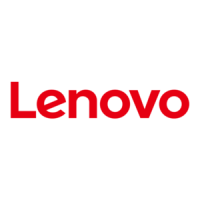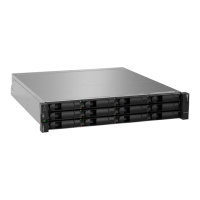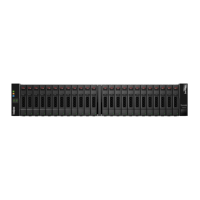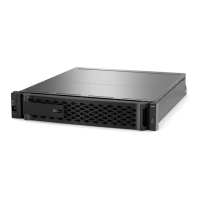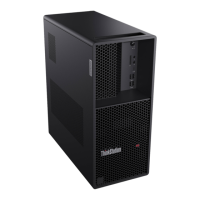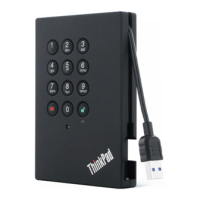(2) Seven-segment display
(3) Host Link LEDs (Controllers without two base-board ports on the rear do not have the
LEDs)
3.
From ThinkSystem System Manager, confirm that the controller’s status is Optimal.
If the status is not Optimal or if any of the Attention LEDs are on, confirm that all cables are
correctly seated, and check that the HIC and the controller canister are installed correctly. If
necessary, remove and reinstall the controller canister and the HIC.
If you cannot resolve the problem, contact technical support.
4.
If the new HIC ports require SFP+ transceivers, install these SFPs.
5.
If you installed a HIC with SFP+ (optical) ports, confirm the new ports have the host protocol
you expect.
a.
From ThinkSystem System Manager, select Hardware.
b.
If the graphic shows the drives, click Show back of shelf.
c.
Select the graphic for either Controller A or Controller B.
d.
Select View settings from the context menu.
e.
Select the Host Interfaces tab.
f.
Click Show more settings.
g.
Review the details shown for the HIC ports (the ports labelled e0x or 0x in HIC Location slot
1) to determine if you are ready to connect the host ports to the data hosts:
▪ If the new HIC ports have the protocol you expect: You are ready to connect the new
HIC ports to the data hosts; go to the next step.
▪ If the new HIC ports do not have the protocol you expect: You must apply a software
feature pack before you can connect the new HIC ports to the data hosts. See
Change
host protocol for DE2000H and DE4000H. Then, connect the host ports to the data
hosts and resume operations.
6.
Connect the cables from the controller’s host ports to the data hosts.
If you need instructions for configuring and using a new host protocol, refer to the
Linux
express configuration, Windows express configuration, or VMware express configuration.
6.2.8. What’s next?
The process of adding a host interface card to your storage array is complete. You can resume
normal operations.
100

